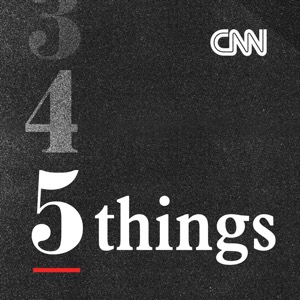Hey there. We've got your weekly dose of feel good stories. We have some stories this week that just might bring you a little peace in a hectic week. Like a far out poem from a MacArthur Genius Grant winner and a newly discovered piece of classical music from one of the all time greats.
We didn't know about it that it would be just such a banger.
Plus, can trees be medicine? From CNN, I'm Emily Williams and this is Five Good Things.
'It's fall wedding season. And I don't know about you, but I love hearing about all the different traditions that people uphold. Some couples jump the broom, some brides wear something old and something blue. And sometimes dads will walk their daughters down the aisle. David Jones, a 64- year-old father, was recently tasked with carrying out that tradition. Which meant taking what should have been a two hour car ride from his home in South Carolina, to the wedding venue in Tennessee. But there was a complication. He had to make the trip in the middle of Hurricane Helene.
With all the traffic delays, reroutes and detours, I was just in a mindset of, all right, what's next? So when I came to, you know, literally the end of the road, it was just like, all right. I can't drive. I'm gonna walk.
Now it's important to know that David is a marathon runner. So walking the nearly 20 miles he had left to go felt doable.
'Police tried to talk me out of it, state troopers, people clearing the roads. I told him all - my daughter's walking down the aisle at 11 this morning and I'm going to be the one walking her down.
He had to navigate mud and road debris, and at one point, he grabbed a road reflector to make sure motorists could see him. But 12 hours later, he made it.
The wedding was beautiful. There was no power at the church, so it was candlelight service. Her, her friends and family came together and really pulled off a beautiful ceremony.
David didn't mention the Dangerous Odyssey until the newlyweds asked him to say a few words and bless the food at dinner.
I told the story at the reception, and that's when she heard it first.
And if that wasn't sweet enough, David promised to make amends for taking the road reflector.
I apologize to whoever's reflector I swiped. Reach out and I'll replace it for you.
You've probably heard that being around trees and other plants is good for you. But how much can they really impact your health? That's what Aruni Bhatnagar, a professor of medicine at the University of Louisville, wanted to find out. He said other studies about trees and health were associative, meaning that, yes, people living in areas with more green spaces might be healthier, but that could also be caused by other factors like wealth or access to medical care. He wanted to look at this differently, like a clinical trial. Only in this case, trees would be the medicine.
In clinical trials, you give people medicine. And we said instead of giving medicines, we are going to put trees in their neighborhood.
So last year, Aruni and the team behind the Green Heart Project started by measuring air pollution in several neighborhoods in Louisville, Kentucky, and strategically planting trees in areas with the most pollution. To really see an impact, these weren't just saplings. They planted mature trees between 15 and 20ft tall. And then they measured and compared health outcomes for people in areas that got new trees and areas that didn't. The results were pretty exciting. People in areas with new plantings had about 20% lower levels of a certain inflammatory blood marker.
Inflammation is the ground soil over which chronic diseases develop. So this decrease in inflammation corresponds to about 10 to 15% decrease in the rates of heart attacks in that area.
He said that's about the same impact you'd see from exercising regularly, like 30 minutes a day, five times a week for decades. And people in these neighborhoods said they're feeling the impact.
This one person said, 'every day, when I turn back and I see this large tree lined street. It just makes me happier and feel better no matter what.'
It's always exciting when one of your favorite artists releases a new song. But what if that artist has been dead for more than 200 years? That's the case for Mozart fans after a previously undiscovered piece was just proven to be written by the iconic composer. The sheet music, which dates back to around 1780, had been stored in the archives of a library in Leipzig, Germany. Librarian Annalena Aring said the piece had his name, Wolfgang Mozart, written at the top, but not in his handwriting.
We didn't know if it was really a Mozart piece.
'So Salzburg-based Mozart scholar, Ulrich Leisinger did some digging and found a letter written by Mozart's sister, that references her brother writing the piece. He'd proven it. The sheet music was the real deal.
We didn't know about it, that it would be just such a banger. I read some comments on social media like Mozart dropped his new song and it was just for everyone. Because I think Mozart is perhaps kind of a superstar still.
The piece is called Serenade in C. It's pretty short by classical standards, just 12 minutes long. It's written for two violins and a cello.
It's quite uplifting, I would say. It gives the piece a special brightness because the violins, they are playing very high. And I think if you know that it's Mozart and you know some pieces, then you can can hear the Mozart out of it.
The library, worked with the local music school to put on a special performance of the piece at the Opera House in Leipzig last month. Three local students took on a uniquely difficult challenge, playing a piece of classical music that's new not just to them, but to the world.
There's a saying that the best things in life find us when we're not looking. Well, imagine winning an award for being extraordinarily talented and not even knowing you were nominated. That's what happened to one of the 22 people who were awarded a MacArthur Fellowship last week. Some call it a quote, genius grant for short. Genius because it's designed to help recipients produce more extraordinary work with the help of an $800,000 grant. When professor and former US Poet Laureate, Juan Felipe Herrera, got the call, he had to be convinced.
Juan Felipe Herrera
00:07:05
I thought it was, you know, one of those fun calls or spam. So I said, okay, bye, thank you, bye. Boom. And that really wasn't the best way to answer.
Juan Felipe says the MacArthur Foundation called back and they straightened things out right away.
Juan Felipe Herrera
00:07:21
It left me speechless and totally excited and thankful all at the same time.
'The 75-year-old says his mother introduced him to poetry at a very young age. But it wasn't until he got to high school that he started writing and reciting it seriously. The subject matter of his poems varies - from highlighting the sociopolitical experiences of Chicano people like him, to embracing unity and kindness.
Juan Felipe Herrera
00:07:46
Compassion, kindness, unity, harmony, humanity. I think if we tap those those fountains right there, then everything will be solved, most likely.
He's written dozens of books, won several literary awards, and his work has been commissioned by institutions like NASA and the Kentucky Philharmonic. Juan Felipe says he'll be focusing future works on topics like nonviolence, compassion and humanity's connection with the cosmos. In fact, one of his poems was inspired by actor William Shatner's trip to space in 2021 when he was 90 years old. He was gracious enough to recite it for us.
Juan Felipe Herrera
00:08:26
The alignment of William Shatner in space for Mr. Shatner
Juan Felipe Herrera
00:08:32
Earth and its tiny life permanent
Juan Felipe Herrera
00:08:35
Particles impermanent
Juan Felipe Herrera
00:08:38
It does not matter
Juan Felipe Herrera
00:08:39
At its height in the stars in the gone vessel of Oxygen, that was ours for a moment
Juan Felipe Herrera
00:08:45
The dark void
Juan Felipe Herrera
00:08:46
Not the infinite dark void, that is the cosmos
Juan Felipe Herrera
00:08:52
That is the rotations, the galaxies, endless creative dissolution
Juan Felipe Herrera
00:08:57
Who are we here?
You can find the rest of the poem in his book, California Brown: Illuminations and Hollers.
Up next, we get a little lesson in communication skills from dolphins.
A new study looked at how dolphins communicate when they play and the results are pretty darn cute. CNN's Eryn Mathewson is here to break it all down for me. Hi, Eryn!
Hey, Emily! So, yeah, that's right. A group of scientists in Italy and France did this study where they watched dolphins while they played. And they saw that when dolphins play together, they make this open mouth expression. It looks kind of like a smile.
Oh that's cool. So do they think the smile is serving any sort of purpose when they're playing?
Actually, yes. So the study, which was published last week in the journal iScience, found that dolphins almost always make that facial expression when the dolphin they're playing with can see them. And their playmates made the expression back about a third of the time. So they think it's a way for them to communicate with each other, that this is playtime. So there isn't a risk of it escalating into a fight.
Okay. That makes sense. I feel like people do that too. We smile when we want to show we're friendly. You know, things are all good here.
Exactly. I do have to say, a dolphin communication expert who wasn't involved in the study did tell CNN that the word "smile" could be a bit of a stretch. She explained it isn't necessarily the same as when a chimp or humans smiles in response to doing something fun. But this facial expression is a way for dolphins to say to each other, Hey, we're on the same page.
I mean, communication is key, right? I guess for dolphins also.
All right. That's all for now. Join us tomorrow for the next edition of One Thing. Host David Rind and CNN's Steve Contorno discuss how the response to Hurricane Milton and Helene is playing on the campaign trail. Five Good Things is a production of CNN Audio. This episode was produced by Eryn Mathewson and me, Emily Williams. Our senior producers are Felicia Patinkin and Faiz Jamil. Matt Dempsey as our production manager. Dan Dzula is our technical director and Steve Lickteig is the executive producer of CNN Audio. We get support from Joey Salvia, Haley Thomas, Alex Manasseri, Robert Mathers, Jon Dianora, Leni Steinhardt, Jamus Andrest, Nichole Pesaru and Lisa Namerow. Special thanks to Katie Hinman. Thanks so much for listening. Come back next week.




